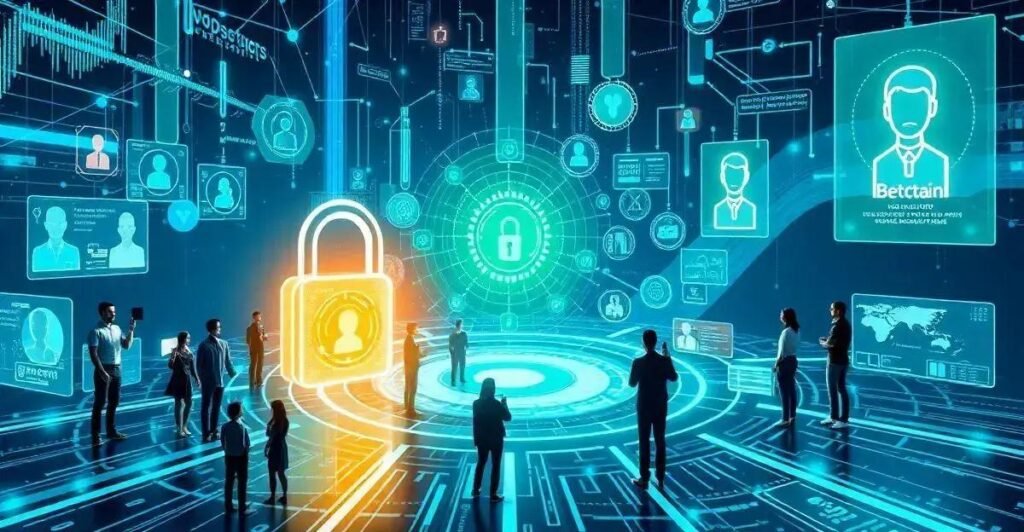Decentralized identity verification is transforming the landscape of online security.
By utilizing blockchain technology and innovative cryptographic methods, it allows individuals to manage their personal information without relying on central authorities.
This empowers users with greater control over their identities, enhances privacy, and minimizes the risk of data breaches.
In this article, we will delve into the core concepts of decentralized identity verification, explore its benefits and challenges, and examine its potential applications in various sectors.
Understanding Decentralized Identity Verification
Understanding Decentralized Identity Verification is essential in today’s digital world. It lets users control their identity without relying on centralized systems. This method uses blockchain technology to create secure, tamper-proof identity data. With this system, individuals can share their identity details when needed without exposing their entire personal information. This enhances security and reduces the risk of identity theft.
Benefits of Decentralized Identity Systems include enhanced privacy and user control. Users can choose what information to share with whom, limiting unnecessary data exposure. This system also reduces dependency on large corporations, empowering users and fostering trust. Moreover, it can lead to quicker verification processes, benefiting both users and service providers.
Challenges in Decentralized Identity Verification involve technical and regulatory hurdles. Users must understand how to protect their private keys, which are crucial for accessing their identities. Additionally, there are concerns regarding the legal status of decentralized identities and how they fit within existing frameworks.
Technologies Behind Decentralized Identity include blockchain, cryptographic algorithms, and decentralized networks. This technology allows for secure transactions and validations. Users can generate unique identifiers that are verifiable but do not disclose their identity. Each interaction is securely recorded without compromising personal privacy.
Real-World Applications of Decentralized IDs are emerging across various sectors like finance, healthcare, and education. For example, banks can use these systems for Know Your Customer (KYC) processes, ensuring secure transactions while protecting user data.
The Future of Identity Verification looks promising, with many organizations adopting these decentralized systems. As users demand more control over their personal data, it’s likely that these technologies will continue to gain traction, leading to more secure online experiences.
Benefits of Decentralized Identity Systems

Benefits of Decentralized Identity Systems are numerous, providing both users and service providers with enhanced security and privacy.
One significant advantage is that it gives users full control over their personal data. They can decide what information to share and with whom, minimizing risks of data exposure. In addition, this system can speed up identity verification processes, making transactions smoother and faster.
Another benefit is the reduction of fraud and identity theft. Decentralized identities are often secured using advanced cryptographic methods, making it very difficult for unauthorized parties to gain access. This leads to a more trustworthy digital environment for all users.
Moreover, decentralized identity systems can reduce the need for multiple logins across platforms. Users can access different services with a single digital identity, simplifying their online experience while maintaining security.
Ultimately, as more organizations adopt these systems, the standard for online identity verification will improve, aligning with users’ expectations for security and privacy.
Challenges in Decentralized Identity Verification
Challenges in Decentralized Identity Verification are numerous and complex, impacting its wider adoption.
One significant challenge is user education. Many people are unfamiliar with how decentralized systems work, which can hinder their willingness to use them. They need to understand concepts like private keys and cryptographic security to manage their identities effectively.
Another challenge is interoperability. Different organizations may use various systems that don’t communicate well with one another. This can lead to confusion and limit the utility of decentralized identities across platforms, making it difficult for users to manage their identity consistently.
Additionally, regulatory compliance poses a barrier. As decentralized identities often operate outside traditional systems, aligning them with current legal frameworks is complicated. Companies may face uncertainty regarding how decentralized identities fit into laws surrounding data protection and user privacy.
Security remains another concern. While decentralized systems can provide improved security, they are not immune to risks. Users must protect their private keys, as losing them can result in permanent loss of access to their identities. Therefore, creating user-friendly methods for securely managing these keys is crucial.
Last but not least, scalability issues may arise. As the number of users grows, decentralized identity systems must handle increasing amounts of data and requests without sacrificing performance or security. Addressing these challenges is vital for realizing the full potential of decentralized identity verification.
Technologies Behind Decentralized Identity

Technologies Behind Decentralized Identity play a crucial role in ensuring security, privacy, and user control. The foundation of decentralized identity systems is blockchain technology. By using a distributed ledger, these systems can store identity information securely while ensuring that no single entity has complete control over the data.
Another key technology is cryptography. Cryptographic methods safeguard user information and facilitate secure identity verification. Using public and private keys, users can authenticate themselves without revealing their actual identity, maintaining privacy.
Decentralized Identifiers (DIDs) are also essential. They allow users to create unique identifiers that are not tied to a central authority. Each DID can be verified using blockchain, providing an efficient way to confirm identity.
Furthermore, smart contracts enhance the functionality of decentralized identities by automating secure transactions based on predefined conditions. These contracts can facilitate secure and trusted interactions online without needing intermediaries.
In addition to these technologies, protocols and frameworks like Self-Sovereign Identity (SSI) enable individuals to manage their identities independently. SSI solutions allow users to control their own data, granting access only when necessary and tracking who accessed it.
Overall, the combination of these technologies creates a robust infrastructure for decentralized identity, ensuring that users can verify their identities safely and privately in the digital world.
Real-World Applications of Decentralized IDs
Real-World Applications of Decentralized IDs are emerging across numerous sectors, showcasing the versatility and importance of this technology.
In healthcare, decentralized IDs can help patients manage their medical records securely. Patients maintain control over who accesses their data, which increases privacy and protects sensitive information.
In finance, decentralized identity systems are used for Know Your Customer (KYC) processes, simplifying and securing the onboarding of customers. Financial institutions can verify identities without retaining excessive personal data, thus enhancing trust.
Education is another field benefiting from decentralized IDs. Educational institutions can verify academic credentials without relying on centralized databases. This helps prevent fraud and ensures that only verified qualifications are accepted.
Furthermore, e-commerce platforms utilize decentralized identities to streamline user accounts. Users can shop online using their decentralized identities, reducing friction and enhancing security during authentication.
Additionally, government services may adopt decentralized identity models to provide citizens with secure access to public services. By verifying identities without a central authority, governments can improve efficiency and reduce the risk of identity theft.
Overall, the practical applications of decentralized IDs are revolutionizing multiple sectors, paving the way for improved security, privacy, and user empowerment in the digital landscape.
The Future of Identity Verification

The Future of Identity Verification is rapidly evolving as technology advances. As decentralized identity systems gain traction, we can expect greater user control and security. With more organizations adopting these solutions, users will enjoy a seamless experience across platforms. The reliance on traditional identity verification methods may decline as trust in decentralized systems grows.
Innovative technologies like artificial intelligence and machine learning will further enhance identity verification processes. These technologies can analyze vast amounts of data to detect anomalies and potential fraud in real-time, ensuring a higher level of security.
Moreover, incorporating decentralized identities into smart cities will streamline access to various services. Citizens will have the ability to prove their identity easily while maintaining privacy. This shift will create more efficient public services and improve overall user experience.
As the regulatory landscape adapts, we can anticipate clearer guidelines for decentralized identity verification. Lawmakers will work to create frameworks that protect user rights while ensuring compliance with security standards. This makes decentralized systems more acceptable to businesses and government agencies.
The future holds promise for a more secure and user-centric approach to identity verification. With technology advancing rapidly, decentralized identity systems are likely to become mainstream, offering individuals a way to control their digital identities safely.
Frequently Asked Questions about Decentralized Identity Verification
What is decentralized identity verification?
Decentralized identity verification allows individuals to control their personal data without relying on centralized authorities, often utilizing blockchain technology.
What are the benefits of decentralized identity systems?
Benefits include enhanced privacy, user control over personal data, reduced identity fraud, and streamlined verification processes.
What challenges do decentralized identity systems face?
Significant challenges include user education, interoperability between different systems, regulatory compliance, and security of private keys.
What technologies are behind decentralized identity?
Key technologies include blockchain, cryptography, decentralized identifiers (DIDs), smart contracts, and Self-Sovereign Identity (SSI) frameworks.
How are decentralized IDs applied in the real world?
Real-world applications include healthcare record management, financial KYC processes, academic credential verification, e-commerce user authentication, and public service access.
What does the future hold for identity verification?
The future may see advancements in user control, integration with smart technologies, clearer regulatory guidelines, and wider adoption of decentralized systems.



